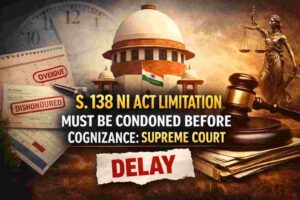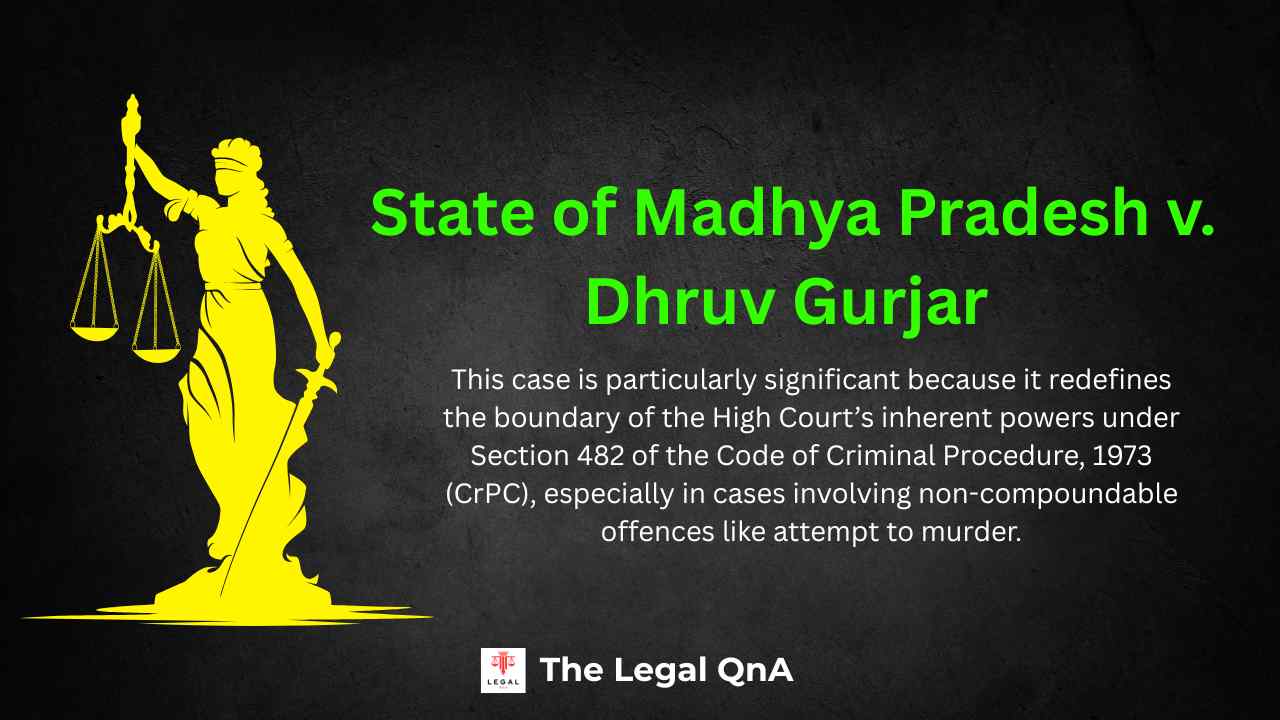(Supreme Court of India, Criminal Appeal No. 336 of 2019, decided on 22 February 2019)
This case is an important decision of the Supreme Court of India dealing with the limits of the High Court’s powers under Section 482 of the Code of Criminal Procedure (CrPC).
It clarifies that serious criminal offences which affect society at large cannot be quashed merely because the accused and the complainant have entered into a compromise.
Background of the Case
An FIR was lodged against Dhruv Gurjar and others at Police Station Kotwali, District Datia, Madhya Pradesh, for offences under Sections 307, 294, and 34 of the Indian Penal Code. The complaint alleged that the accused, due to previous enmity, came to the complainant’s house armed with a firearm. Dhruv Gurjar allegedly fired at the complainant with intent to kill him, causing injuries on his forehead, shoulder, and ear.
In another related matter, Tinku Sharma and others were accused of robbery under Section 394 of the IPC, Sections 11 and 13 of the Madhya Pradesh Dakaiti and Vyapharan Prabhavit Kshetra Adhiniyam, and Sections 25 and 27 of the Arms Act.
In both matters, the accused approached the Madhya Pradesh High Court under Section 482 CrPC seeking quashing of the criminal proceedings on the ground that they had entered into a compromise with the complainant. The High Court allowed their petitions and quashed the FIRs, holding that further proceedings would serve no purpose.
The State of Madhya Pradesh filed appeals before the Supreme Court challenging the High Court’s decision.
Issues Before the Supreme Court
- Whether the High Court was justified in quashing FIRs for serious and non-compoundable offences like attempt to murder and robbery on the ground of compromise.
- Whether such offences can be treated as private disputes between individuals.
Submissions of the State
The counsel for the State argued that the High Court had acted in error. It quashed the FIRs mechanically without examining the nature of the offences or their effect on public order.
The State submitted that offences under Sections 307 and 394 IPC are grave in nature and cannot be quashed simply because of a compromise. Such crimes are against society and not merely against an individual victim.
It was also pointed out that in one of the cases the accused were absconding and had managed to obtain compromise affidavits from the complainants while evading arrest.
The State relied on several judgments including Gian Singh v. State of Punjab and Narinder Singh v. State of Punjab to show that quashing should not be allowed in cases involving heinous crimes.
Submissions of the Respondents
The counsel for the accused supported the High Court’s decision. It was argued that since the parties had settled their differences and the complainant was no longer interested in pursuing the case, continuing with the criminal proceedings would be futile.
The defence relied on previous judgments where courts had permitted quashing after settlement, especially in cases involving family or civil disputes.
Observations of the Supreme Court
Justice M. R. Shah, delivering the judgment, held that the High Court had erred in quashing the FIRs without considering the seriousness of the offences.
The Court emphasized that offences like attempt to murder, robbery, and those under the Arms Act are serious and have a social impact. Such offences are not private wrongs that can be settled between individuals.
The Supreme Court noted that the High Court had failed to apply the correct test while exercising powers under Section 482 CrPC. The High Court should have examined whether the offences were of such nature that quashing would serve the ends of justice or whether it would undermine public interest.
The Court referred to earlier precedents such as Gian Singh v. State of Punjab, Narinder Singh v. State of Punjab, and Parbatbhai Aahir v. State of Gujarat, which held that the power to quash criminal proceedings must be used cautiously and only in cases where the offences are predominantly of a personal or civil nature.
Court’s Reasoning
The Supreme Court observed that the offences under Sections 307 and 394 IPC are non-compoundable as per Section 320 of the CrPC. Such offences are considered crimes against society. Even if the complainant and the accused have reached a compromise, the High Court must consider whether allowing quashing would damage the larger public interest.
The Court further held that merely because a complainant agrees to compromise does not mean that there is no possibility of conviction. Evidence from other witnesses or medical reports could still prove the offence. Therefore, presuming that conviction is impossible is unjustified at the preliminary stage.
Decision of the Supreme Court
The Supreme Court allowed the appeals filed by the State of Madhya Pradesh. It set aside the orders of the High Court that had quashed the FIRs and restored the criminal proceedings against all the accused.
Principle Established
The judgment reaffirmed that High Courts cannot quash criminal proceedings in serious and non-compoundable offences solely on the ground of compromise between the accused and the complainant. Such offences are not merely private disputes but have broader implications for society.
Follow The Legal QnA For More Updates…















